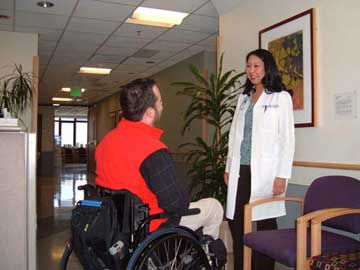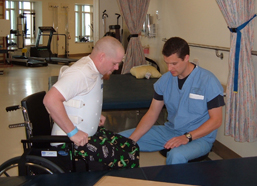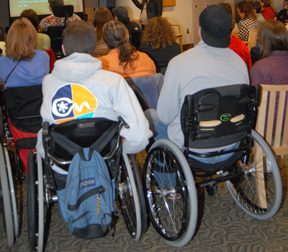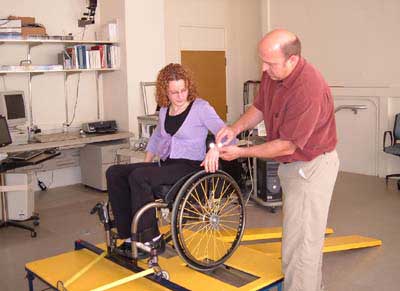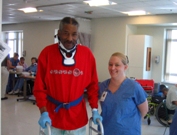Spinal Cord Injury Update
Fall 2013: Volume 22, Number 3
"I Saw It On The Internet!"
Finding Reliable Health Information Online
Like most people with SCI, you probably use the Internet to find health information. How do you know if what you find is accurate, trustworthy and up-to-date?
Why should you be careful about information you find on the Internet?
- Anyone can create an official-looking website and post information.
- Search engine results are selected by computer software and not by human experts, and the search results that come out on top are not necessarily the best websites.
- Websites may be sponsored by companies that are selling products or looking for clients, so their information may be biased, inaccurate and/or incomplete.
- Medical science is continually learning new information through research and practice. It is important to use the most up-to-date information to make your health care decisions.
How to find health information you can trust
Is the source of information respected, credible and unbiased?
- Websites sponsored by government, educational institutions, or credible professional organizations like the National Spinal Cord Injury Association are more likely to provide unbiased information than commercial websites.
Look at the web address (also called URL) to see what type of organization is sponsoring the website.
- .gov = U.S. government
- .edu = educational institution
- .org = professional or not-for-profit organization
- .com = commercial website (be cautious)
- Reliable websites make it easy for you to identify the purpose and owner of the site. If you can’t find this information, the site may not be trustworthy.
- Do not rely on personal websites for your information.
- If the purpose of the site is to promote commercial products or services, the health information provided may be biased.
- Be cautious of information presented if there are advertisements on the website. If there are ads, they should be separate from health information.
- Contact information should be provided so you can reach the website owner easily.
- Be careful with links. If a link on a trusted website directs you to an entirely new website, do not assume that this new website also has trustworthy information.
Is the information up-to-date?
- Look for posting dates or the phrase ‘last updated’ on the web pages to see if the information is current.
- Look for other indications that the website is not up-to-date, such as an outdated events or news page.
- If links on a website do not work, the website may not be updated regularly.
Is the information presented based on facts?
- Does it sound too good to be true? Be skeptical of health information that contains claims of a “miracle cure.”
- Look for indications that the information on the web page is based on research or expert review and not just opinion.
- Are research articles or other original sources of information provided?
- Is there a clear statement of where the information presented comes from or how it is evaluated?
- Compare the information you find on one credible website with information on other websites to see if it is consistent.
- Verify health claims that are based on personal testimony by checking trustworthy sources or experts. Online support groups, forums or blogs are a great way to share experiences and information but should not be considered a trusted source of medical advice.
- Evaluate the strength of the health claims presented. A health claim based on one small study is not as reliable as a health claim based on the findings of many large-scale studies.
How to avoid scams and viruses
- Be careful if the website says you have to register or sign up in order to access the information or if it offers to send you free products or information in the mail.
- Review the privacy policy to make sure the website will not share your information with a third party.
- Avoid websites that have
pop-ups.
- Do not download files from a website unless you know it is trustworthy.
Using search engines
- Combine terms in order to focus your search. For example, to find information on dealing with pain for people with SCI, enter “pain AND spinal cord injury.”
- Use double quotes to find an exact phrase (“assistive technology”).
- Use OR to search for both words or phrases (exercise OR “physical activity”).
Talk to your health care provider
Check with your health care provider about information you have found on the Internet before trying something new. To make the most out of your time with your health care provider:
- Share only health information that comes from several credible websites.
- Don’t share complete documents but make a brief list of your questions.
- Ask your health care provider to suggest some websites that might be useful to you.
Trustworthy websites to get you started
- MedlinePlus, National Library of Medicine. http://www.nlm.nih.gov/medlineplus/
- Centers for Disease Control and Prevention, US Department of Health and Human Services. http://www.cdc.gov
Learn more
- Evaluating Internet Health Information: A Tutorial from the National Library of Medicine.
http://www.nlm.nih.gov/medlineplus/webeval/webeval_start.html
- Evaluating Health Information. MedLine Plus, National Library of Medicine.
http://www.nlm.nih.gov/medlineplus/evaluatinghealthinformation.html
- “Top Ten” Most Useful Consumer Health websites. Medical Library Association. https://www.mlanet.org/resources/userguide.html

